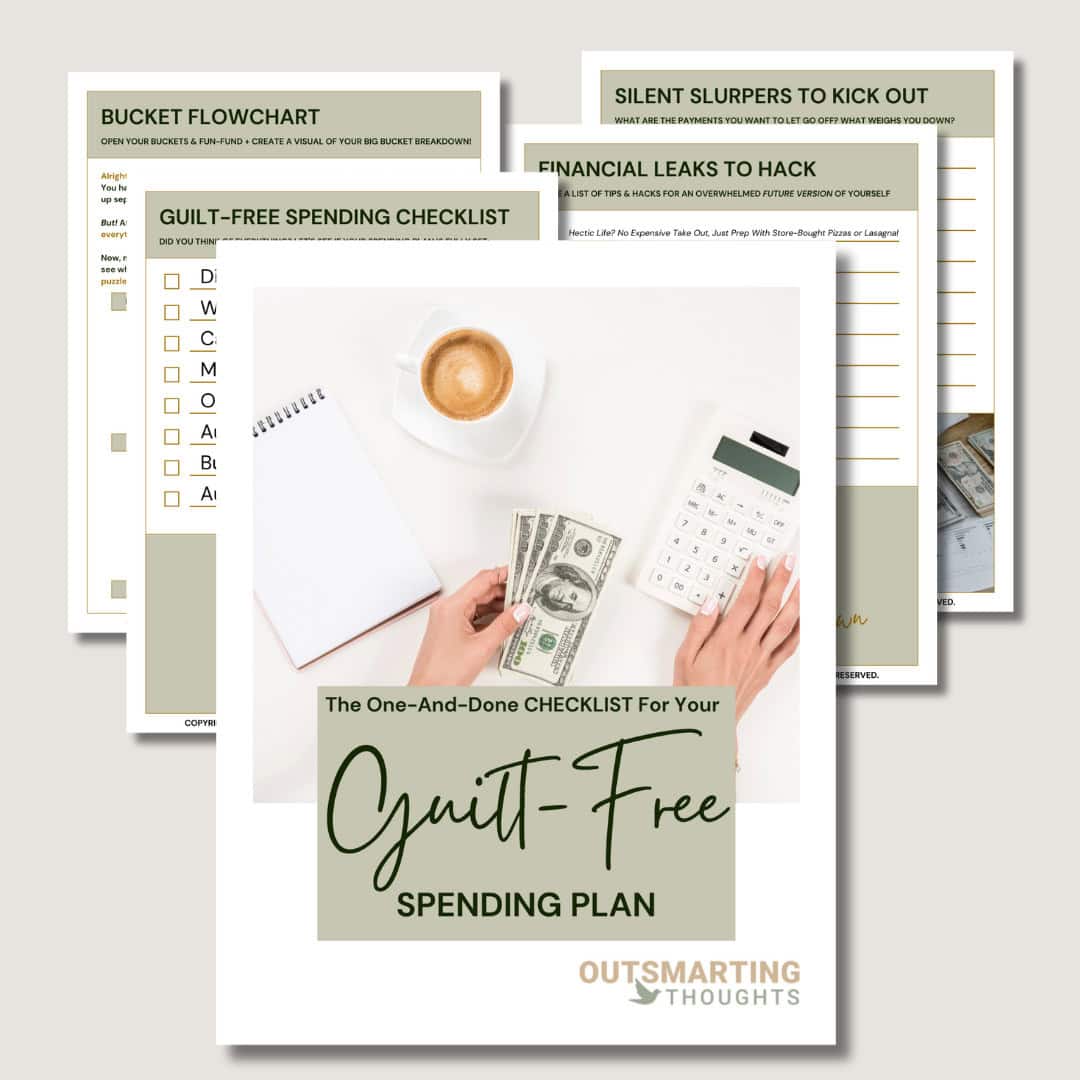Wanna know what overcoming overspending actually takes, and why most people never get past the shame spiral? This post is dedicated to helping you break the cycle for good by treating overspending as a symptom instead of a character flaw, because it’s a behavioral loop you’re ready to outgrow!
Overspending doesn’t just wreck your budget. It also wrecks your self-trust. You keep swiping, then spiraling, then promising internally to do better, only to fall back into the same exhausting loop. This pattern doesn’t take place because you’re weak or lacking discipline! It finds its roots in you being stressed, dysregulated, out of willpower, and doing your best to survive with a nervous system that’s on fire. Overachievers like you are great at pushing through. But financial control? That takes something entirely different. That takes rebellion, identity, and strategy.
What you’re going to learn is how to shift from short-term coping to long-term leadership. You’ll discover why your brain gets stuck in the overspending loop, how to rewire it with real strategy (not guilt), and what it takes to build emotional clarity into your money management system.
After you have learned how to anchor your spending behavior to your goals, your values, and your future identity, you’ll be able to stop chasing dopamine hits and start chasing direction. You’ll finally stop labeling yourself as ‘bad with money’and start acting like the strategic, self-respecting adult you actually are.
This post is all about overcoming overspending, so you can stop leaking power, start building true self-trust, and finally lead your financial life with clarity and intent. You deserve nothing less.
Overcoming Overspending
Overspending is about way more than just losing money. When you uncover the pattern’s layers, it’s way more about losing emotional balance. When life keeps weighing heavy, your brain & nervous system are craving for relief HARD. And so… Overspending becomes your go-to pressure valve. It doesn’t mean you’re lacking character. This is a mean pejorative & judgmental misconception. But it does mean you’ve been coping in the only way your system knew how, and it’s only up to you to change the dynamic.
This isn’t a simple bad habit to hack. It’s a strongly ingrained behavioral loop tied to survival. You’re not choosing to give in to temptation, but you’re trying to stay functional in a world that keeps demanding more, and more, and more. And letting go of a survival tool like that? That takes strength, strategy & courage. Most of all, it takes rebellion, autonomy, and powerful belief in yourself.
Overcoming overspending isn’t just about changing how you use money. It’s about changing how you relate to yourself. This is a shift away from emotionally dysregulated chaos, and moving into financial maturity. It’s your signal that you’re ready to no longer be at the mercy of marketing tricks, and instead take charge & ownership of your hard-earned cash.
RELATED POST:
The Overspending And Depression Hell-Loop: Find Out The Missing Link Between Feel-Good Purchases And Inner Emptiness
Wanna hear the best part? You do NOT need to become a spreadsheet geek or penny-pinching perfectionist! You just need a strategy that aligns with your brain, personality & lifestyle. And that is easier than you think.
The Problem Isn’t Spending. It’s Emotional Dysregulation.
Overspending, contrary to popular belief, doesn’t come from laziness or a lack of character. It really finds its roots in being emotionally maxed out, and having zero willpower left over to fight back against consumer culture. When your nervous system is in survival mode, it doesn’t care about budget or long-term goals anymore. It cares about one thing: soothing the stress. It’s like gasping for air when you’re drowning. On a neuroscientific level, survival mode sadly keeps us away from making the right decisions.
If you’ve been living with chronic pressure, unresolved stress, or emotional exhaustion, then of course your brain is looking for a way to cope with all of that. Overspending & impulse buying is just an option you’ve subconsciously opted in on. Probably wiser coping mechanisms than doing drugs or binging into obesity, man could argue. But this also means something profound: you’re not a mess. You’re just dysregulated. It’s not YOU, it’s your environment. And that distinction changes everything: it restores your innocence.
RELATED POST:
Psychological Reasons For Overspending & How To Outsmart Them (Spoiler Alert: It’s Not YOUR Fault!)
The spending becomes the only moment you feel excited, alive, and in actual control of your happiness. Unfortunately, that hit of control is fleeting. And the chaos that follows? That’s your responsibility. In a way, this is a mean double whammy. But that’s what happens naturally when there’s no structure underneath the stress.
To break the loop, you don’t need more judgment. You need a nervous-system-approved strategy that grounds you when life keeps throwing punches. The issue isn’t about being bad with money. It’s about being bad with emotional dysregulation.
Rewiring The Pattern: A Level Up On Life
Overcoming overspending isn’t about removing temptation. It’s about building something stronger in it’s place. When your life lacks structure & strategy, your nervous system will keep chasing those soothing quick fixes. That’s WHY you can’t help but keep swiping, even when you KNOW better. You’re not chasing the actual stuff. You’re chasing balanced, emotional regulation.
If you want to stop overspending long-term, you need to stop thinking in terms of willpower and start thinking in terms of systems and strategies. You can’t just rely on willpower to resist impulses, you have to replace them with something that actually grounds you. So let’s see how we can develop a strategy, shall we?
ANSWER THIS: WHAT DO YOU WANT YOUR MONEY TO DO FOR YOU?
The strategy starts with your bucket list. Not the fantasy version, but the real one: the life you’re building toward. Do you want peace of mind by having a safety net of $500? Do you want to travel? Take the kids to Disneyland before they’re 12? Once your budgeting goals are clear, you can hold on to them for dear life when the marketing techniques try to exploit your lack of willpower again. I know this sounds fluff, but it really works like an actual anchor. Don’t knock it ’till you’ve tried it!
RELATED POST:
How To Turn Budgeting Goals Into Action Plans & Personal Milestones With Just 6 Steps!
ANSWER THIS: HOW CAN YOU MANAGE YOUR MONEY SO YOU ACTUALLY STAY IN CHARGE OF IT?
From there, it’s essential to choose a money management method that matches your energy and lifestyle. Don’t force yourself into tracking your spending when that overwhelms you! Instead, choose one that fits how your brain actually works. You deserve a system & strategy that back you up in turbulent times. It’s supposed to help you see your progress and reach your budgeting goals, not just set limits and restrictions that drain even more willpower.
RELATED POST:
7 No-Bullshit Budgeting Strategies That Let You Spend Guilt-Free While Still Saving Big
ANSWER THIS: HOW CAN YOU FORGIVE YOURSELF FOR MAKING MISTAKES ALONG THE WAY SO YOU DON’T GIVE UP?
Rewiring these neural pathways & habits isn’t about perfect decisions and actions. You will slip up many times after, and that’s something you should allow. As long as you get back up and don’t give up! It’s about constant alignment and taking your resources and hard-earned cash seriously. About prioritizing the long-term game over short-term gains. Every time you connect your spending to your actual goals and values, you reinforce the level up of life you’re aiming for. And the longer you stay connected to that game, the more you stop seeing spending as relief, and start seeing your confident clarity as power.
RELATED POST:
How To Stop Overspending: The Strategy You NEED To Regain Control (Without The Self-Blame Spiral)
Owning a cashflow strategy is a skill that’ll give you some serious advantages in life. I think budgeting is an aligned action with taking life seriously, and I seriously believe life will reward you for it. If you’re not into high-maintenance strategies like ‘tracking your spending’ and just want to sit down ONCE to direct your financial future, our Guilt-Free Spending Plan Printable is the right cashflow strategy for you! Don’t let anybody outsmart you out of your own money and start budgeting today by simply filling out the form below:

Want a free
ONE-AND-DONE CHECKLIST for aGUILT-FREE SPENDING PLAN? Free up your bandwidth and stop overthinking with this
FREE One-And-Done Checklist for your Guilt-Free Spending Plan!
Simply fill out the form below to get this strategy
delivered straight to your inbox!
Upgrade Your Beliefs & Identity, Not Just Your Habits
You don’t overcome overspending by forcing yourself into better behavior. Instead, you overcome it by upgrading the story you tell about yourself. Because, if you still believe you’re ‘just bad with money’, you will always set yourself up for failure and act like you really are bad with money. Even when you’re trying your best, these habits & beliefs will keep pulling you back.
However, this is not as fluff as just saying affirmations. It’s about alignment with your personal power, about owning it. You’re NOT someone who fails with money. You’re someone who hasn’t been taught to use money in a way that feels safe, strategic, and aligned to your goals & values. You can start turning that around ANY DAY of the week!
Long-term change starts when you stop identifying with the problem and start identifying with the solution. You’re not a reckless spender, you’re an investor in your level-up, in your future. You’re a buildor. A protector of your future self. A strategic adult who’s learning how to steer their financial life with intention.
RELATED POST:
Intentional Spending: The CEO-Mindset And AntiDote Against Overspending & Impulse Buying
This new controlled and empowered identity makes different choices. You’re in boss mode here. That identity doesn’t panic when a hard day hits. Instead, it pauses, reassesses options, and reminds itself what it’s building. And when you slip? That identity doesn’t spiral. It resets and adjusts, and keeps going and trying. It gets back in control asap.
You’re not chasing toxic power by wanting to stay in charge of your financial life. You’re building self-trust and self-control. Trust grows from repeated alignment with who you really want to become. It grows when you observe that you take care of your self, and can stand your ground. That’s the long-term game. That’s the true level-up.
Building A Long-Term Strategy That Feels Like Relief
Most people try to fix overspending by trash-talking themselves, and by cutting back. But that’s a cruel short-term solution for a long-term problem. It’s a bandaid at best, not an actual medicine. The real win? Creating a financial system that gives your nervous system exactly what’s missing: safety, clarity, and structure.
RELATED POST:
The Overspending And Depression Hell-Loop: Find Out The Missing Link Between Feel-Good Purchases And Inner Emptiness
Here’s the shift that matters most: when you define what you want from life, AND back that up with a money management method, you WILL stop spinning. You will stop feeling behind. You won’t panic about every little expense, because you KNOW. This combination gives you control over the situation because you’re not guessing anymore. You’re not hoping, you’re in charge! You’re following a track: one you built yourself.
Once you’ve made your bucketlist concrete enough and translated them into budgeting goals, AND picked a budgeting strategy that fits your lifestyle, things will start to click into place. Overspending, over time, loses its grip. You begin to see your financial progress isn’t so much of a struggle. It’s more a natural byproduct of your vision and your system working together.
This strategy is anything but theoretical. This is the real path out. I know because I’ve experienced it. Do your future self a favor, and start turning things around too. Know what you’re building. Use the tools that match YOU. And keep coming back to your long-term goals like they’re home base. Because they are.
Overcoming Overspending (Summary)
Overcoming overspending isn’t about fixing your ‘lack of character’, it’s about upgrading your responses to emotional dysregulation with more strategic patterns. You’ve been coping with stress, exhaustion, and pressure in the only way your nervous system knew how. But now? Know you have everything you need to make the shift.
Don’t get me wrong, this change isn’t a quick fix. It’s a complete level-up on life. You’re dedicating yourself to learning how to manage your energy, your goals, and your money with strategy and emotional clarity. You’re eventually not going to chase that dopamine anymore, because you’re creating stability that actually lasts.
It starts with knowing what you want, with turning a bucket list into budgeting goals. Then you pair that with building a money management method that supports how you work best. One that lets you move from chaos to calm, from guilt to groundedness. You’re not behind, you’re waking up. You’re choosing leadership over reactivity. Knowing what you want + working with a system to get what you want = the actual road to getting what you want!
Every decision you make from here builds that version of you who doesn’t just survive, but thrives. You’re building safety, ownership, and financial self-trust. And that’s not just money work, that’s identity work. This is your true upgrade. You’re ready for it. I believe in you, and this overspending series is supposed to be there to have your back!
This post was all about overcoming overspending, so you can stop leaking power, start building true self-trust, and finally lead your financial life with clarity and intent. You deserve nothing less.
We aim to help you out as much as possible, but please keep in mind that the content is only for general informational and educational purposes. We offer our services based on independent research and life-experience only, and so our strategies can never serve as a substitute for professional advice. Trust me, we do not have 'everything figured out', are all still huge works in progress, but hey, what works for us, might work for you too! This is allll up for you to decide... It might not work for you, and that's okay, so cherrypick the stuff that resonates and leave the stuff that doesn't, and let's go!








